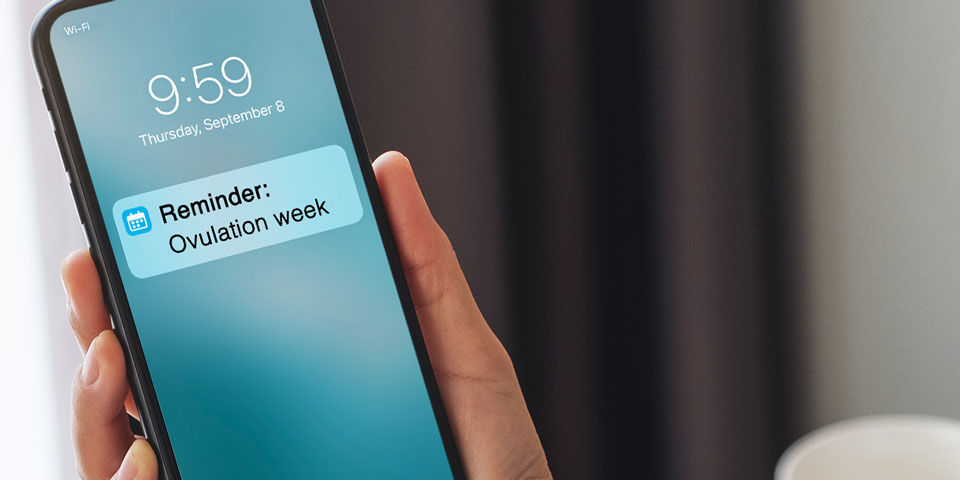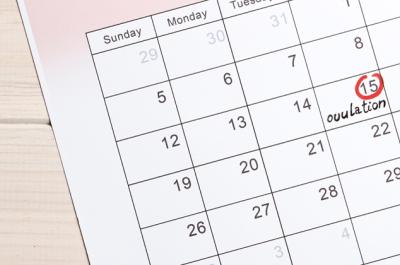Ovulation and pregnancy: Six common questions, answered

Ovulation describes the process when hormone changes trigger one of your ovaries to release an egg. But how long does ovulation last, and how can you tell when it’s coming? The process happens more quickly than you might think, which makes it even more important to track if you’re trying to get pregnant.
Here, we’ll answer some common questions about ovulation and how it relates to pregnancy — as well as how to identify your most fertile days.
In this article
- 1. Can you get pregnant after ovulation?
- 2. Can you get pregnant when you’re not ovulating?
- 3. What are the chances of getting pregnant on ovulation day?
- 4. Can you ovulate without having a period?
- 5. What are common pregnancy symptoms soon after ovulation?
- 6. What are ovulation tests, and how do they work?
- Related Blog Content
1. Can you get pregnant after ovulation?
Yes, but only for the first 12-24 hours after ovulation.
After you ovulate, an egg moves into the fallopian tube, where it is capable of being fertilized by a sperm cell for just 12-24 hours.1 If it’s not fertilized in that window, the egg will disintegrate and be absorbed into the uterine lining and later shed during your period.2 So while it’s possible to get pregnant as a result of having unprotected sex after ovulation, it’s only for a short time.
2. Can you get pregnant when you’re not ovulating?
It’s true that, after ovulation, an egg has only 12-24 hours in which to be fertilized by sperm.1 However, sperm cells’ lifespan inside your body can last up to five days when conditions are favorable1 —the most favorable conditions in your cycle are during your fertile window, which starts a few days before ovulation. As a result, you can have unprotected sex a few days before you ovulate and still conceive, as the egg can be fertilized by sperm that’s already present. That means the best time to try for a baby is during the five days leading up to ovulation, as well as the day of ovulation.
You do need to ovulate in order to get pregnant.
Your body does need to release an egg during your cycle in order for you to get pregnant, so if you suspect you’re not ovulating, it’s a good idea to talk to your doctor. Many health factors can affect ovulation and fertility, and together you and your doctor can determine if anovulation (the technical term for not-ovulating during your menstrual cycle) could be an issue for you.
3. What are the chances of getting pregnant on ovulation day?
While the chances of getting pregnant can vary from person to person and cycle to cycle, the day of ovulation and the day before ovulation are generally considered the most fertile days of your cycle.
Fertilization happens when an egg and a sperm cell fuse in the fallopian tube.3 That means your highest chance of getting pregnant is the window of time when live sperm are present during ovulation.1
But that doesn’t mean you have to have sex on the day of ovulation to conceive. As we said before, sperm can survive in your body after sex for up to five days during the fertile window, so it’s a good idea to plan ahead.
4. Can you ovulate without having a period?
You may be wondering if you could still be ovulating regularly if your period is irregular, or if you’ve recently skipped a period (and aren’t pregnant).
The short answer? Maybe.
The longer answer: Having irregular periods may be a sign you have irregular ovulation, too. That’s because a lot of what causes irregular periods can impact ovulation.4
Factors that have been found to affect ovulation include:
- Polycystic Ovarian Syndrome (PCOS). With PCOS, your ovaries produce too much androgen, making it harder for eggs to develop and release from the follicles.5
- Perimenopause. Perimenopause makes your ovaries produce less estrogen, until they stop altogether in menopause.6
- Body weight. Being underweight or overweight can stop ovulation from happening.7
- Stress. Too much physical or emotional stress can affect your ability to get pregnant — since it can prevent ovulation due to a lack of luteinizing hormone (LH).8
Another possible reason you missed your period, or you’re not ovulating, could be pregnancy. Consider taking a pregnancy test if it’s possible you might be pregnant.
If you have concerns regarding any of the above, reach out to your doctor.
5. What are common pregnancy symptoms soon after ovulation?
If you had unprotected sex around ovulation, there’s a chance you could be pregnant. Often the first sign of pregnancy women notice is a missed period, but you can also keep an eye out for these other common signs of early pregnancy:
- Tender, swollen breasts
- Tiredness
- Morning sickness
- Nausea (with or without vomiting)
- More frequent urination
- Fatigue
When do pregnancy symptoms usually start? Some symptoms, such as breast tenderness and fatigue, may start as early as one week after conception.9 If you’re experiencing any symptoms and think you might be pregnant, consider taking a pregnancy test at the appropriate time (based on your test’s instructions) and reaching out to your doctor.
6. What are ovulation tests, and how do they work?
For most women, menstrual cycles vary in length. So does the day when ovulation actually happens each cycle. Luckily, hormone levels in your body can help tell you what’s going on.
Just before ovulation:
- Estrogen rises. Estrogen helps thicken the womb lining and makes sperm-friendly cervical mucus.2
- Luteinizing hormone (LH) surges. LH causes the ovarian follicle to rupture, releasing the egg and allowing it to move down the fallopian tube, ready to be fertilized.2
Home ovulation tests work by detecting this hormonal shift in your urine. Many home tests specifically detect the LH surge, but the Clearblue® Fertility Monitor with Touch Screen and Advanced Digital Ovulation Test measure both estrogen and LH levels. Using an ovulation test, you can find out when your body is preparing to release an egg and detect the days you’re most likely to conceive.
If you’re concerned you might not be ovulating, consider talking to your doctor about potential fertility concerns.
Learning about your ovulation patterns can help prepare you for trying to conceive in the future. Still have other questions? Get in touch with your ob-gyn — they can help give personal advice for your unique concerns and goals.
Related Blog Content
Sources
- Mayo Clinic. “How to get pregnant” Accessed 10 Sept. 2022. https://www.mayoclinic.org/healthy-lifestyle/getting-pregnant/in-depth/how-to-get-pregnant/art-20047611#:~:text=Understanding%20when%20you're%20ovulating,is%20released%20from%20the%20ovary
- The National Institute for Occupational Safety and Health (NIOSH). “What You Should Know About the Female Reproductive System.” Accessed 13 Oct. 2022. https://www.cdc.gov/niosh/topics/repro/femalereproductivesystem.html
- The American College of Obstetricians and Gynecologists. “The Menstrual Cycle: Menstruation, Ovulation, and How Pregnancy Occurs” Accessed 10 Sept. 2022. https://www.acog.org/womens-health/infographics/the-menstrual-cycle
- The National Health Service. “Irregular Periods” Accessed 10 Sept. 2022. https://www.nhs.uk/conditions/irregular-periods
- Mayo Clinic. “Polycystic ovary syndrome (PCOS)” Accessed 10 Sept. 2022. https://www.mayoclinic.org/diseases-conditions/pcos/symptoms-causes/syc-20353439
- The American College of Obstetricians and Gynecologists. “The Menopause Years” Accessed 10 Sept. 2022. https://www.acog.org/womens-health/faqs/the-menopause-years
- American Society for Reproductive Medicine. “Weight and Fertility” ReproductiveFacts.org. 2015. Accessed 10 Sept. 2022. https://www.reproductivefacts.org/news-and-publications/patient-fact-sheets-and-booklets/documents/fact-sheets-and-info-booklets/weight-and-fertility/
- Karen C. Schliep, Sunni L. Mumford, Catherine J. Vladutiu, Katherine A. Ahrens, Neil J. Perkins, Lindsey A. Sjaarda, Kerri A. Kissell, Ankita Prasad, Jean Wactawski-Wende, and Enrique F. Schistermana. “Perceived stress, reproductive hormones, and ovulatory function: a prospective cohort study” National Library of Medicine. 2016. Accessed 10 Sept. 2022. https://www.ncbi.nlm.nih.gov/pmc/articles/PMC4315337/
- National Institute of Child Health and Human Development. “What are some common signs of pregnancy?” Accessed 13 Oct. 2022. https://www.nichd.nih.gov/health/topics/pregnancy/conditioninfo/signs




